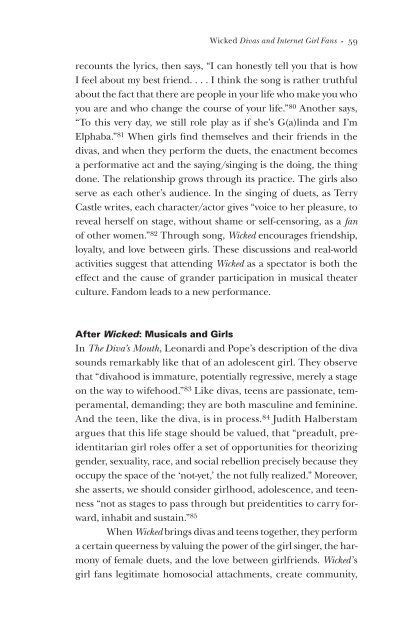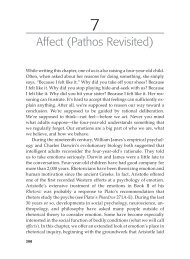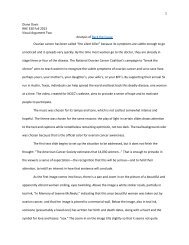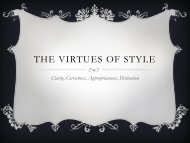(Kristin Chenoweth) and Elphaba - Camera Obscura: Feminism ...
(Kristin Chenoweth) and Elphaba - Camera Obscura: Feminism ...
(Kristin Chenoweth) and Elphaba - Camera Obscura: Feminism ...
- No tags were found...
Create successful ePaper yourself
Turn your PDF publications into a flip-book with our unique Google optimized e-Paper software.
Wicked Divas <strong>and</strong> Internet Girl Fans • 59<br />
recounts the lyrics, then says, “I can honestly tell you that is how<br />
I feel about my best friend. . . . I think the song is rather truthful<br />
about the fact that there are people in your life who make you who<br />
you are <strong>and</strong> who change the course of your life.” 80 Another says,<br />
“To this very day, we still role play as if she’s G(a)linda <strong>and</strong> I’m<br />
<strong>Elphaba</strong>.” 81 When girls find themselves <strong>and</strong> their friends in the<br />
divas, <strong>and</strong> when they perform the duets, the enactment becomes<br />
a performative act <strong>and</strong> the saying/singing is the doing, the thing<br />
done. The relationship grows through its practice. The girls also<br />
serve as each other’s audience. In the singing of duets, as Terry<br />
Castle writes, each character/actor gives “voice to her pleasure, to<br />
reveal herself on stage, without shame or self-censoring, as a fan<br />
of other women.” 82 Through song, Wicked encourages friendship,<br />
loyalty, <strong>and</strong> love between girls. These discussions <strong>and</strong> real-world<br />
activities suggest that attending Wicked as a spectator is both the<br />
effect <strong>and</strong> the cause of gr<strong>and</strong>er participation in musical theater<br />
culture. F<strong>and</strong>om leads to a new performance.<br />
After Wicked: Musicals <strong>and</strong> Girls<br />
In The Diva’s Mouth, Leonardi <strong>and</strong> Pope’s description of the diva<br />
sounds remarkably like that of an adolescent girl. They observe<br />
that “divahood is immature, potentially regressive, merely a stage<br />
on the way to wifehood.” 83 Like divas, teens are passionate, temperamental,<br />
dem<strong>and</strong>ing; they are both masculine <strong>and</strong> feminine.<br />
And the teen, like the diva, is in process. 84 Judith Halberstam<br />
argues that this life stage should be valued, that “preadult, preidentitarian<br />
girl roles offer a set of opportunities for theorizing<br />
gender, sexuality, race, <strong>and</strong> social rebellion precisely because they<br />
occupy the space of the ‘not-yet,’ the not fully realized.” Moreover,<br />
she asserts, we should consider girlhood, adolescence, <strong>and</strong> teenness<br />
“not as stages to pass through but preidentities to carry forward,<br />
inhabit <strong>and</strong> sustain.” 85<br />
When Wicked brings divas <strong>and</strong> teens together, they perform<br />
a certain queerness by valuing the power of the girl singer, the harmony<br />
of female duets, <strong>and</strong> the love between girlfriends. Wicked ’s<br />
girl fans legitimate homosocial attachments, create community,










